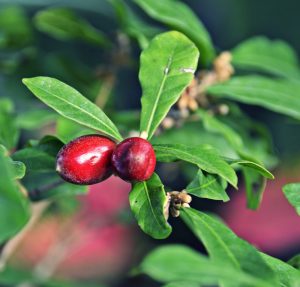Chemotherapy can potentially damage cancer patients’ taste buds, taking away their normal sense of taste. This leads to weight loss and decreased appetite, and may interfere with patients’ natural healing capabilities.
 But a so-called “miracle fruit” (Synsepalum dulcificum) native to Ghana might be the game-changer for which those patients have been waiting. The red berries grow on small emerald trees and some people have been eating the jelly bean-sized tropical fruit for decades to enhance their sense of taste.
But a so-called “miracle fruit” (Synsepalum dulcificum) native to Ghana might be the game-changer for which those patients have been waiting. The red berries grow on small emerald trees and some people have been eating the jelly bean-sized tropical fruit for decades to enhance their sense of taste.
The reason behind this, according to the berries’ growers, is that the fruit binds to taste receptors on the tongue. After eating a single berry, the flavors of food are significantly enhanced in about one hour.
“When I tried the miracle fruit before my meal, my life changed,” Monica Faison-Finch, who was being treated for cervical cancer, said in a press release. “It was like the first time I had tasted food in about five or six weeks. It was like I was having my first meal.”
Faison-Finch is one of the people who received a donation from Miracle Fruit Farm, in Redland, Fla., run by Homestead brothers Erik and Kris Tietig. The Tietig family has donated thousands of miracle fruits to local hospitals, charity organizations and research universities since 1972, to restore cancer patients’ sense of taste. But the company didn’t form until 2012, after the fruit grew in popularity. The brothers now cultivate enough to sell and donate the fruit in large quantities.
“People knew we had it through word of mouth, but over the years, we went from people calling in a dozen times a year to dozens every day,” said Erik Tietig, the farm’s co-owner and chief executive officer.
“We are called and visited by people in one of the hardest times of their life,” he said. “When we’re able to help them … mask that metallic sensation and actually enjoy a meal, it’s really a small victory.”
The berries themselves don’t hold much nutritional value, but their unique glycoprotein, called miraculin, hides unpleasant flavors and intensifies the natural flavors of food.
“Miracle fruit is not a fad. It doesn’t cure cancer or even help prevent cancer,” Erik Tietig added. “But what it does is help alleviate terrible symptoms of chemotherapy in a very real and a very immediate way.”
The berries are in season year-round and sell for between 50 cents and $1 dollar each. However, most of the farm’s production gets donated. “The fruit is available for purchase because it’s the farm’s primary source of business and income,” Erik Tietig said.
The brothers want the farm to remain consistent in its donations to local hospitals and cancer centers. This year, the University of Florida, Miami Cancer Institute and the Soroptimist of Homestead received donations.
The berries are difficult to harvest, however, and it took the Tietig brothers several years to find the best way to produce the fruit in large quantities. It takes the fruit only one to three days to go bad after being harvested from the tree, which contributed to its decreased market value and to making it difficult to find.
“We learned that we can grow them from cuttings,” Tietig continued. “We developed ways to clone them without altering its DNA and then grow them in a controlled environment.”
The brothers are now working on miracle fruit tablets, designed to have a longer shelf life than the actual fruit. Cancer patients swear by it, and there are no known side-effects to date, according to the company’s website.

